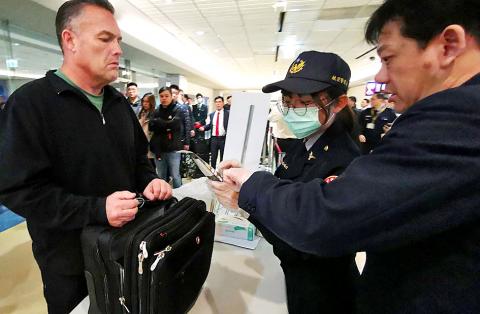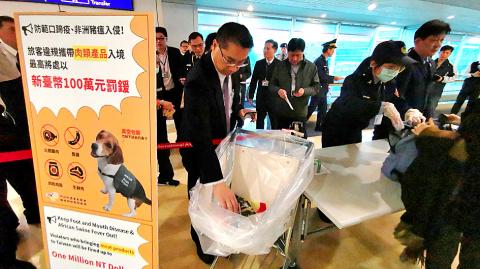Taiwan Taoyuan International Airport customs officers yesterday expanded inspections of carry-on luggage for passengers from China, Macau and Hong Kong — which are at high risk for African swine fever — but a lack of personnel and X-ray machines resulted in long lines of arriving passengers.
The Customs Administration began more thorough luggage inspections on a trial basis for travelers from areas affected by African swine fever to comply with an order given by Premier Su Tseng-chang (蘇貞昌) after he took office on Monday requiring all carry-on luggage from those areas to be manually checked.
The Aviation Police Bureau said it was instructed to assist in the quarantine efforts, adding that it would coordinate with other agencies in inspecting carry-on luggage at boarding gates.

Photo: Tony Yao, Taipei Times
With more than 100 flights daily from Hong Kong, Macau and China, the bureau said it has requested additional personnel from the National Police Agency.
Minister of the Interior Hsu Kuo-yung (徐國勇) yesterday visited the airport to oversee inspections and assisted inspectors by asking tourists to take any meat products out of their carry-on luggage and dispose of them in trash containers.
The inspections are in a trial phase, Hsu said, adding that the government would acquire X-ray machines as soon as possible to facilitate the inspections.

Photo: Tony Yao, Taipei Times
However, before that happens, inspectors would need to manually check the luggage, he added.
The first flight to undergo the trial inspections yesterday morning was an EVA Air (長榮航空) flight carrying 136 passengers from Hong Kong.
Inspectors found a package of sausages carried by a Russian visitor, which they disposed of.
Despite the lines, no arriving passengers were upset by the measure, Hsu said, adding that he found that the average wait time per passenger was about seven minutes.
A seven-minute wait is worthwhile if it keeps the nation from being devastated by African swine fever, he added.
Hsu tried to appease some police who complained that the Bureau of Animal and Plant Health Inspection and Quarantine had not sent enough personnel to help with the inspections, saying that the government would quickly acquire X-ray machines to lessen the workload.
Customs officers estimated that the airport would need 10 additional X-ray machines to inspect carry-on luggage from high-risk areas, costing NT$2 million to NT$2.5 million (US$64,870 to US$81,087) each.
Meanwhile, customs would need an additional 130 to 150 personnel to administer inspections in three shifts, they said, adding that it would also take time and funding to train the additional workforce.
The expanded inspections could trigger complaints from travelers, affecting the annual service quality review, they added.
The National Police Agency’s Border Affairs Corps said it could block the entry of tourists who have been fined by the Bureau of Animal and Plant Health Inspection and Quarantine for bringing contraband into the nation, even after they have passed through passport control.

AGING: As of last month, people aged 65 or older accounted for 20.06 percent of the total population and the number of couples who got married fell by 18,685 from 2024 Taiwan has surpassed South Korea as the country least willing to have children, with an annual crude birthrate of 4.62 per 1,000 people, Ministry of the Interior data showed yesterday. The nation was previously ranked the second-lowest country in terms of total fertility rate, or the average number of children a woman has in her lifetime. However, South Korea’s fertility rate began to recover from 2023, with total fertility rate rising from 0.72 and estimated to reach 0.82 to 0.85 by last year, and the crude birthrate projected at 6.7 per 1,000 people. Japan’s crude birthrate was projected to fall below six,

Conflict with Taiwan could leave China with “massive economic disruption, catastrophic military losses, significant social unrest, and devastating sanctions,” a US think tank said in a report released on Monday. The German Marshall Fund released a report titled If China Attacks Taiwan: The Consequences for China of “Minor Conflict” and “Major War” Scenarios. The report details the “massive” economic, military, social and international costs to China in the event of a minor conflict or major war with Taiwan, estimating that the Chinese People’s Liberation Army (PLA) could sustain losses of more than half of its active-duty ground forces, including 100,000 troops. Understanding Chinese

SELF-DEFENSE: Tokyo has accelerated its spending goal and its defense minister said the nation needs to discuss whether it should develop nuclear-powered submarines China is ramping up objections to what it sees as Japan’s desire to acquire nuclear weapons, despite Tokyo’s longstanding renunciation of such arms, deepening another fissure in the two neighbors’ increasingly tense ties. In what appears to be a concerted effort, China’s foreign and defense ministries issued statements on Thursday condemning alleged remilitarism efforts by Tokyo. The remarks came as two of the country’s top think tanks jointly issued a 29-page report framing actions by “right-wing forces” in Japan as posing a “serious threat” to world peace. While that report did not define “right-wing forces,” the Chinese Ministry of Foreign Affairs was

US President Donald Trump in an interview with the New York Times published on Thursday said that “it’s up to” Chinese President Xi Jinping (習近平) what China does on Taiwan, but that he would be “very unhappy” with a change in the “status quo.” “He [Xi] considers it to be a part of China, and that’s up to him what he’s going to be doing, but I’ve expressed to him that I would be very unhappy if he did that, and I don’t think he’ll do that. I hope he doesn’t do that,” Trump said. Trump made the comments in the context